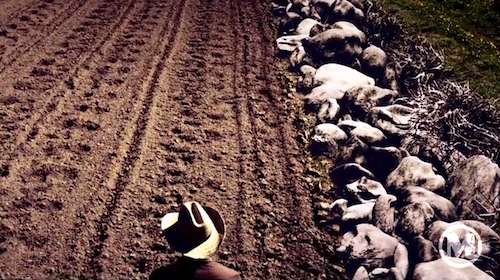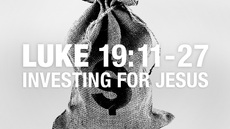As Pastor Mark preaches in this week's sermon, Jesus says that where we put our money is an indicator of where our heart is. But why does Jesus say that? And what does that look like? For answers to those questions, we'll go back the December 2001 sermon, "Tithes and Offerings," from the original Proverbs sermon series.

"Give yourself first to the Lord. Your money is a consequential issue."
Proverbs talks a lot about prudence, planning, patience, and wisdom. You and I need to start by setting a budget, looking at our income, and being faithful with what we've got. So we give first to the Lord and then work the rest out.
The importance, and unimportance, of giving
God is not concerned about your money as much as he is about you belonging to him. Once you belong to him, then all of your wealth and possessions belong to him as well. But, just giving him money will not appease him. You can't buy your way to Heaven. You can't give money to God and think that he’s going to let you off for sin because of that.
Who should give
Should non-Christians tithe? No. Christians need to know that it is our job to pay the bills so that non-Christians can be in the church and hear about Jesus. We have a lot of non-Christians who come to Mars Hill. We’re glad you’re here. You are our guest. But, I will tell you this: Don’t give your money if you don’t belong to the Lord. Give yourself first to the Lord. Your money is a consequential issue.
Why we give
One of the reasons the Lord wants us to give to him first is that it forces us to budget, organize, plan, and prioritize our expenses. You say, "Man, I’ve gotta live off a fixed amount. I gotta be careful with this." We have a financial coaching ministry in the church. We’ll help you plan a budget and organize your finances. We’re going to do all that we can to help you think through these things as a church body. But, if you can’t give and it's just because you’re undisciplined, then don’t think that making more money is going to cure it. If you waste $100, you'll waste $1,000 and you'll waste a million dollars if you don’t have a plan. By contrast, the people who give the most tend to have their whole life in order.
"You want to view your tithes and offerings as investments. It takes time. You plant it. You wait."
In the end, there are two kinds of people: faithful and unfaithful. That’s it, and money is just one indicator of that faithfulness. It's part of your life and faith. Jesus says, "Where your treasure is, that’s where your heart is." God wants to have you abound in grace and goodness in all dimensions. The people who read their Bible, pray, serve, do ministry, love the Lord, they also give. The people who don’t, don’t. It’s very simple. Paul says God wants to abound in all of your life, not just your giving. Giving is a part of it. It’s a place to start.
How we give
Money in the Bible is talked about in terms of an agrarian view of life. You want to view your tithes and offerings as an investment. It takes time. You plant it. You wait. Whether they’re investments in your children, your marriage, your household income—whatever it is, you’re going to have to be patient. You plant your seed and then you wait patiently for there to be a
harvest. But, Jesus says, he who sows sparingly, reaps sparingly as well. If you cast a few seeds, you only get a couple baskets of fruit. You throw handfuls of seed, you get a whole orchard. You want to sow generously. And then, you want to see an enormous harvest.
"The point is this: whoever sows sparingly will also reap sparingly, and whoever sows bountifully will also reap bountifully. Each one must give as he has decided in his heart, not reluctantly or under compulsion, for God loves a cheerful giver. And God is able to make all grace abound to you, so that having all sufficiency in all things at all times, you may abound in every good work." 2 Corinthians 9:6–8
For more, check out Pastor Mark's posts part 1 and 2 on how to be fruitful in your discipleship, and Pastor Jamie's post on four things that make good fruit. 













